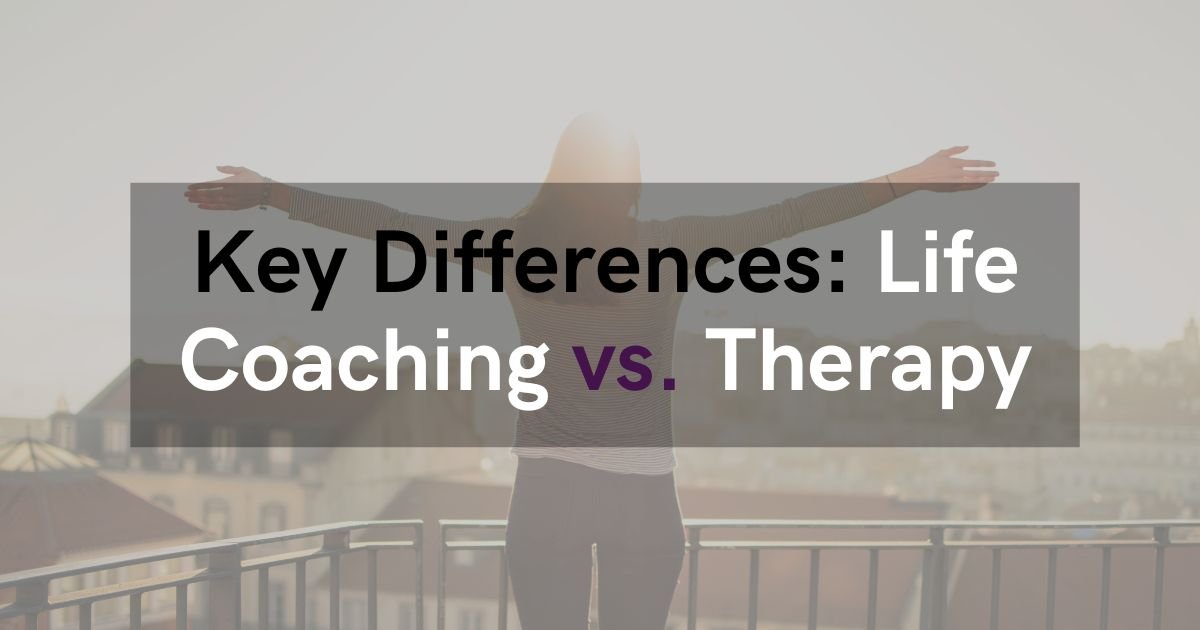Seeking personal growth or healing? Those facing obstacles often pursue life coaching or therapy. It might seem like they are interchangeable—merely branding differences. Some assume therapy connotes you’re broken, while coaching implies potential. Yet looking closer at those who have tried both reveals meaningful differences in focus, techniques, accountability, and outcomes. Essentially, life coaching employs tools and accountability through action plans to manifest goals and ambitions. It is like a personal trainer for your whole life. Therapy involves more processing of emotional wounds and the past as a healing guide. Both can catalyse growth, but they take distinct paths. Understanding the key variations allows for matching the process to individual needs. While coaching and therapy both aim to help overcome challenges, they diverge significantly in approach. Recognising distinctions assists in evaluating which serves best.
Key Distinctions Between Life Coaching and Therapy
Goal Orientation
The contrast emerges in orientation: life coaching fixates on the future while therapy dissects the past. Coaching rallies people to realise untapped potential through envisioning goals and then systematically building skills to achieve them. The coach cheers on the client’s ambitions without judgment. Therapy tends to diagnose and treat dysfunctional patterns that cause emotional suffering. The therapist helps confront pain buried in the past so the client can become unencumbered. While both aid in moving forward, coaching charges ahead fueled by visions of what is possible, while therapy reconciles what went wrong before.
Structure and Techniques
Life coaching employs an eclectic toolkit of exercises and assignments tailored to client goals, like improving time management or communication skills. More freeform than clinical approaches, coaching builds motivation along with capabilities. Therapy relies on established frameworks like assessments, diagnosis, and the formulation of treatment plans. Strict ethics codes govern the therapeutic relationship, while coaching allows more leeway. This enables coaching to flexibly respond to client needs, but therapy provides a grounded methodology.
Accountability and Action Plans
Coaches provide extensive accountability through action plans that map goals into achievable steps. Consistent tracking of progress is required to sustain momentum, leveraging the client’s strengths. Therapists also make recommendations, but emotional processing is the priority rather than the completion of tasks. Accountability looks different when the focus is on regulating mood versus manifesting ambitions. Coaching’s task orientation lights a fire under personal agency, while therapy seeks to stabilise before leaping boldly outward.
Developing Skills
Coaching builds concrete life skills such as optimising productivity, financial planning, communicating assertively, or delivering impactful presentations. By establishing new habits and competencies, clients achieve ambitious aims. Therapy hones the regulation of emotions, stress, and distortions about oneself or others. The focus is on coping versus external capability-building. Clients stabilise dysfunctional patterns that impact their quality of life. Life Coaching in London thus enhances performance, while therapy fosters functioning first.
Duration of Services
Coaching remains short-term, ceasing when clients integrate skills and accomplish deliberately outlined goals. Therapy persists, with no defined endpoint. Symptom fluctuations and new challenges emerge over time. Coaching sprints towards milestones contrasts with therapy’s marathon, which is dependent on evolving needs. Hence, duration diverges—coaching as intensive skill-building bursts or therapy’s open-ended processing.
Relationship
Coaching fosters a peer-like collaborative partnership. Therapy observes boundaries befitting the clinician-client relationship. Coaches afford more flexibility in discussing matters apart from advancements, while therapists ethically avoid dual relationships. Thus, coaches become more familiar while the therapists carefully safeguard professionalism. For some, befriending conveys care, while for others, distance denotes respect.
Outcomes
Coaching targets enhanced performance—whether career productivity, financial freedom, healthy relationships, or purpose alignment. Therapy seeks improved functioning via reduced symptoms like lessened anxiety or depression. Hence, coaching facilitates a life well lived through goal achievement, while therapy establishes preconditions for stability.
Choosing Between Life Coaching and Therapy
The decision to seek additional support for your personal growth is an important one. Both life coaches and therapists can provide immense value, but their fundamental approaches differ. Consider what you hope to achieve before deciding which professional is the best fit.
Life coaches empower you to manifest the life you envision through goal-setting and strategic action plans. They motivate you to actualize your highest potential. If you know your destination but struggle with the roadmap, a coach may be ideal.
Therapists illuminate self-awareness and support you through deep emotional work. They support you in overcoming mental challenges, processing difficult emotions, and healing from unhelpful past experiences. A therapist’s caring direction can put you on the road to inner peace, whether you’re dealing with trauma, loss, marital problems, or mental health concerns.
Choose the professional whose approach aligns with your personal growth goals. With an open heart and the right support, you can move forward into your brightest future.
Conclusion
The key takeaway is that life coaches and therapists both provide value but have different approaches. Life coaches empower you to set goals and take action to create the life you want. Coaching includes processing emotions, overcoming obstacles, and healing from past experiences, but the key difference between coaching and therapy is quite often that coaching is always forward looking and the aim is to get from A to B. It’s like when you take a taxi, you have to know where you are going and need to be able to tell your taxi driver your final destination. In therapy, you don’t need that. Therapists help you process emotions, overcome inner obstacles, and heal from past experiences. Before seeking support, reflect on your personal growth goals. Do you want to manifest an envisioned life? Or do you need to process complex feelings and heal from emotional wounds? Once you know what you hope to achieve, you can determine which professional is the best fit for your journey.

